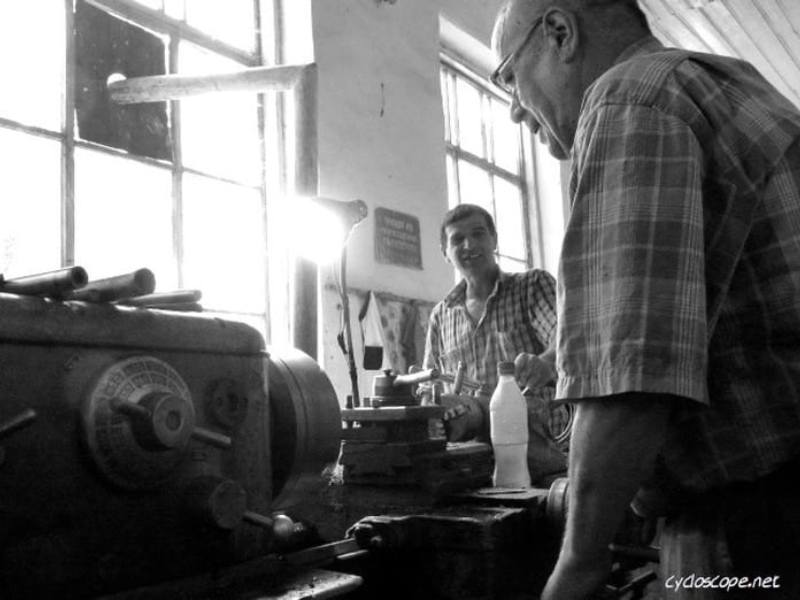Last Updated on 7 December 2023 by Cycloscope

Adventure Travel in Azerbaijan: Ivanovka, the last Kolkhoz
While looking for interesting things to see and do in Azerbaijan, we found out about Ivanovka, the last kolkhoz in Azerbaijan, and possibly in the whole former Soviet Union. A kolkhoz is a form of collective farming, where all the villagers are workers and share the profit of their work in equal parts.
Here in Ivanovka, this collective farming is still practiced by the local ethnic groups of the Molokans, a sect of ethnic Russians deported at the time of the Tsar for their refusal to adhere to the Orthodox rite. It’s weird to see that those keeping on with communism are the more religious in the country.
We traveled to Ivanovka during our bicycle trip in Azerbaijan, take a look at our articles about
How we get to Ivanovka from Baku
We go to the Baku bus station, and our host Ismail tells us to take two urban buses to get there. While stuck in the traffic jam for almost one hour we realized that by feet we would be already there, be aware when taking a bus in Baku. To reach Ivanovka we first have to go to Ismailli the bus will leave in about an hour, it is a big coach with air conditioning. It takes about three and a half hours for less than 200 kilometers.
The road is up and down, and the landscape is completely desert but with fascinating dunes. We arrive in Ismailli at 7 pm, the cousin of our Baku host will shelter us here, but he can’t come to pick us up, he’s at work. So we hitchhike. Pretty easy, there stops the first car we see! It just goes to Kurdmashi, the village where our new host lives, his name is Rovshan.
The driver that picked us up asked us who’s guests were, they knew Rovshan and they gave him a phone call. We arrive in front of the market and wait there. After a few minutes in fact (while all the villagers stare curiously) a white Lada with five people on board, a lady says “hello”, it seems that she is our host (is Rovshan’s mother we realize later).
In some way we go, me and Daniele in the front seat and all the others (four persons) behind. All of them have gold teeth, except Rovshan’s mother. I don’t know if I have already mentioned this, but here everybody has gold teeth.
The house is beautiful, all made of wood and with lots of windows. But in the summertime, life goes on outside, where there is a huge porch furnished with a kitchen, sofa, and a big carpet. There’s also a big and nice garden full of flowers and vegetables.
We are immediately fed with some kind of bucatini, cooked for over 30 minutes. There are also the children of Rovshan, one of about a year and a half which is called Ismail (again), and another of about 7 years old. Then there is the wife. And finally, around 10 pm also comes Rovshan from work, as far as we understand (his English is a bit “fancy”), he’s an inspector for the municipality of Ismailli.
In Ivanovka: the Last Kolkhoz

The next day, we go to Ivanovka, the last kolkhoz in Azerbaijan and possibly in the whole former Soviet Union. Here live the Molokans, a sect of ethnic Russians deported at the time of the Tsar for their refusal to adhere to the Orthodox rite.
80% of the population is composed of Molokan, and there is some “mixed” marriage that is not well received by the community. Some people do not even know a word of Azerbaijani even if they have lived here for a few centuries.
Agriculture and farming are still practiced collectively. The kolkhoz is divided into departments, each of which focuses on a particular sector (tractors, vines, animals).
At the end of the year, they sell products on the market (but no longer with the Soviet Union’s rules) and share the profits. It’s weird to see that those keeping on with communism are the more religious in the country.
The operation of the kolkhoz is explained by Tanya, a Russian lady who has lived for six years in Ivanovka with her husband Jhon, a British man, and runs a guest house. She offered us tea and gave us a bit of the wine produced there, then told us where to go to buy the cheese, the “blue gate No. 2.”
Let’s go for a walk around the fields, and here we find ourselves in the tractors department, a big yard where these old fossils are parked, but they seem to work still. Then there is the workshop for repairs.
While we’re out there, the manager (who looks like the guy from CSI Miami, but with gold teeth) takes us for a “tour” of the factory. It seems to leap in time. Then he takes us into his office and prepares tea again.
Meanwhile, there are always workers who come to show him their work, he gives them some notes, but we do not understand what they are. After the visit to the tractors we walk through the fields, there are vineyards and then a “roadblock”. In practice a small house where the men are drinking tea.
They tell us we can not proceed further because there are buffalos. And they again offer us tea. Then we go to buy cheese which Tanya recommended and get back to hitchhike for Kurdmashi. One of the guys who drives us offers a ride to Lahic for tomorrow. It ‘a funny man and, needless to say, with gold teeth.


